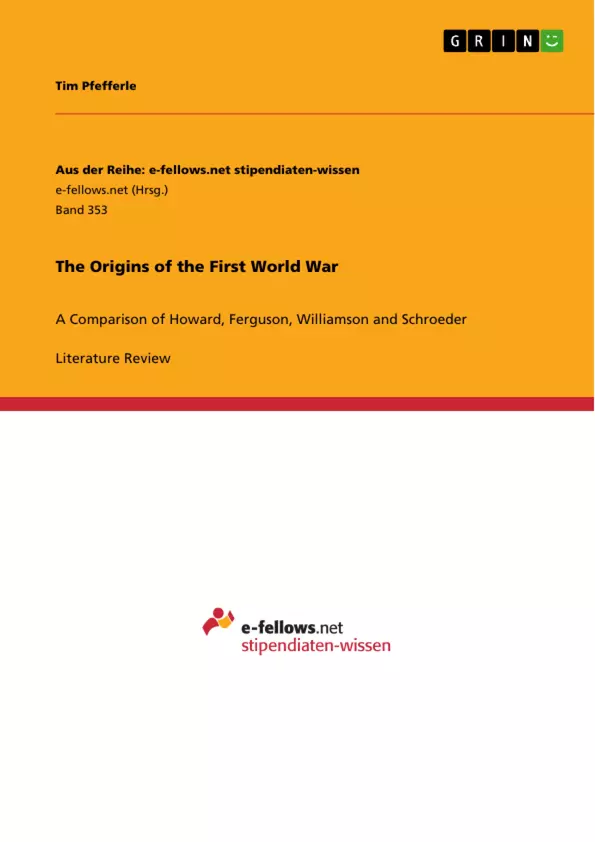This essay examines the origins of the First World War in the context of three dimensions; the geographic location of the war's genesis, the debate about structural and contingent factors, and the differentiation between international and domestic influences. The authors covered are Michael Howard, Niall Ferguson, Samuel Williamson and Paul Schroeder.
Inhaltsverzeichnis (Table of Contents)
- The Origins of the First World War
- Geographical Determinants
- Agency and Structure
- Domestic and International Factors
Zielsetzung und Themenschwerpunkte (Objectives and Key Themes)
This essay examines four different accounts by Michael Howard, Niall Ferguson, Samuel R. Williamson, Jr., and Paul W. Schroeder, respectively, in the context of their analysis of the geography of the origins of the war, the importance of agency and structure, as well as the significance of domestic and international factors. It will be argued that an exaggerated attention to Western Europe is misleading, and that agency has to be understood in the context of structural imperatives, which, together with predominantly international factors, formed the central catalysts in the lead-up to war.
- The role of Western Europe versus Eastern Europe in the origins of World War I
- The interplay between agency and structure in the outbreak of war
- The impact of domestic and international factors on the lead-up to war
- The importance of Austria-Hungary as a systemic actor
- The significance of alliance configurations and power politics in the outbreak of war
Zusammenfassung der Kapitel (Chapter Summaries)
- Geographical Determinants: This section compares and contrasts the geographical perspectives of four historians, examining their focus on Western Europe, Eastern Europe, and the Balkans. It highlights the differing emphasis on Germany, Austria-Hungary, Serbia, and Britain in their respective accounts.
- Agency and Structure: This section analyzes the role of individual actions and large-scale patterns in the outbreak of war. It contrasts the views of Howard and Ferguson, who prioritize agency, with those of Schroeder and Williamson, who emphasize structural imperatives and systemic factors.
- Domestic and International Factors: This section explores the influence of domestic and international issues on the lead-up to war. It examines the authors' perspectives on the role of domestic factors such as Germanophobia and the conservatism of the German military, as well as international factors such as Britain's desire to maintain naval hegemony and Russia's Pan-Slavism.
Schlüsselwörter (Keywords)
The main keywords and focus topics of this essay are the origins of World War I, agency, structure, domestic and international factors, Western Europe, Eastern Europe, Austria-Hungary, Serbia, Germany, Britain, alliance configurations, and power politics. The essay examines the interplay of these factors in the outbreak of war, analyzing different historical perspectives and challenging the traditional narrative of German war guilt.
Frequently Asked Questions
What were the primary geographic origins of WWI?
While traditional narratives focus on Western Europe and Germany, modern historians like Williamson and Schroeder emphasize the Balkans and the existential crisis of Austria-Hungary as central catalysts.
What is the "Agency vs. Structure" debate in WWI history?
It questions whether the war was caused by the deliberate decisions of individual leaders (Agency) or by unavoidable systemic pressures like alliance systems and power politics (Structure).
How did domestic factors influence the outbreak of war?
Internal pressures, such as the conservatism of the German military or Pan-Slavism in Russia, created domestic environments that made international de-escalation difficult.
Why is Austria-Hungary considered a "systemic actor"?
As a multi-ethnic empire, its survival was tied to the international order. Its conflict with Serbia forced other powers into the war due to the rigid alliance configurations of the time.
Does the essay support the "German War Guilt" theory?
The essay challenges a purely German-centric view, arguing that the war resulted from a complex interplay of international factors and structural imperatives across all major powers.
- Quote paper
- Tim Pfefferle (Author), 2011, The Origins of the First World War, Munich, GRIN Verlag, https://www.hausarbeiten.de/document/184579


